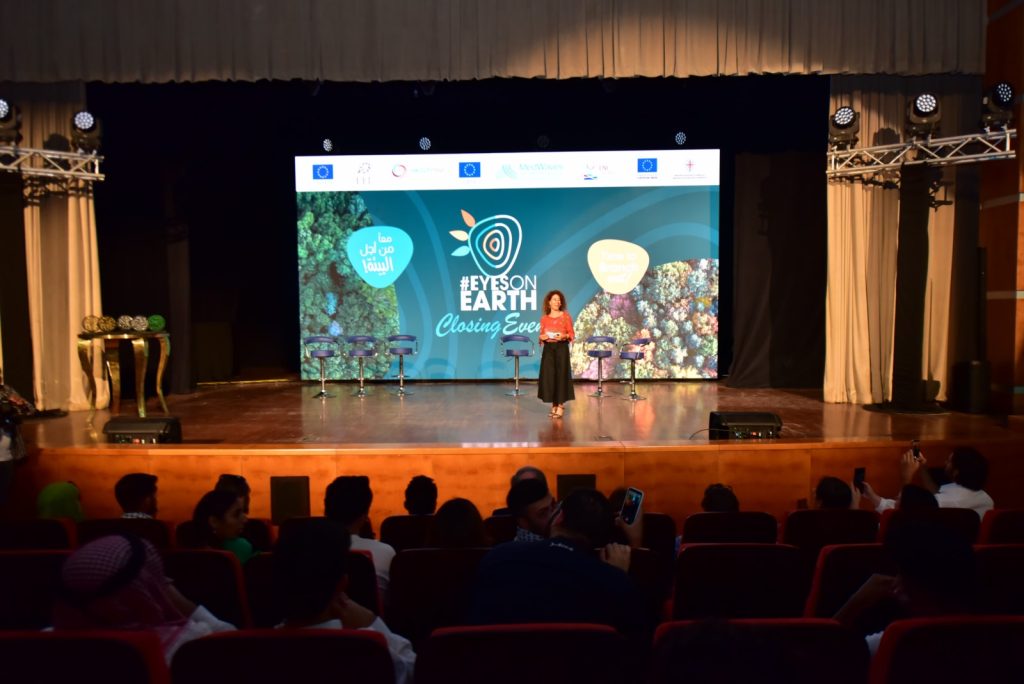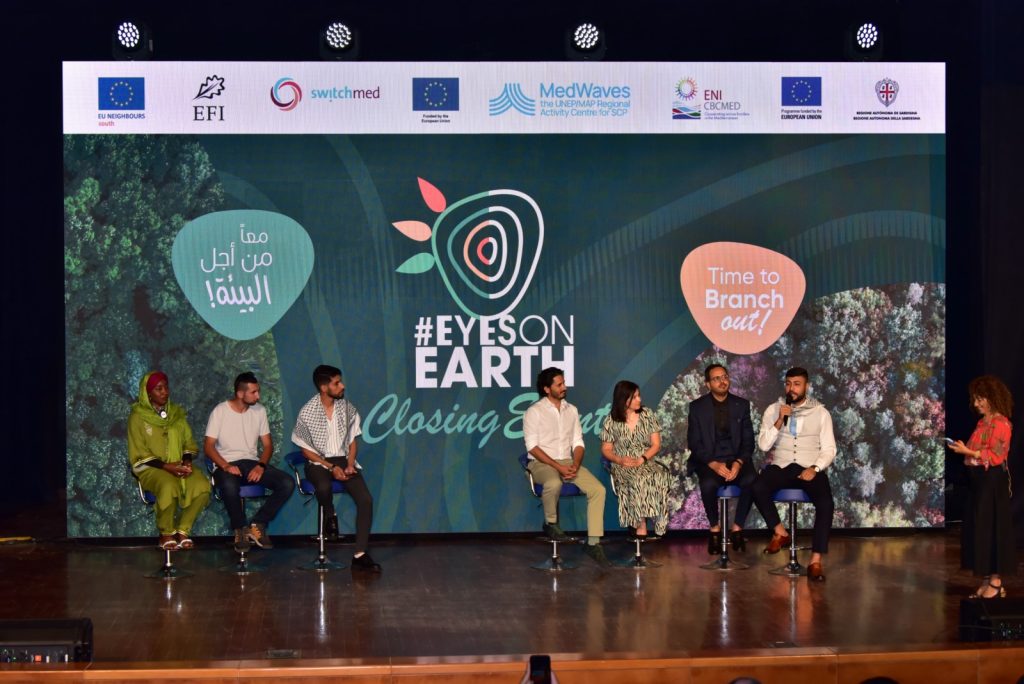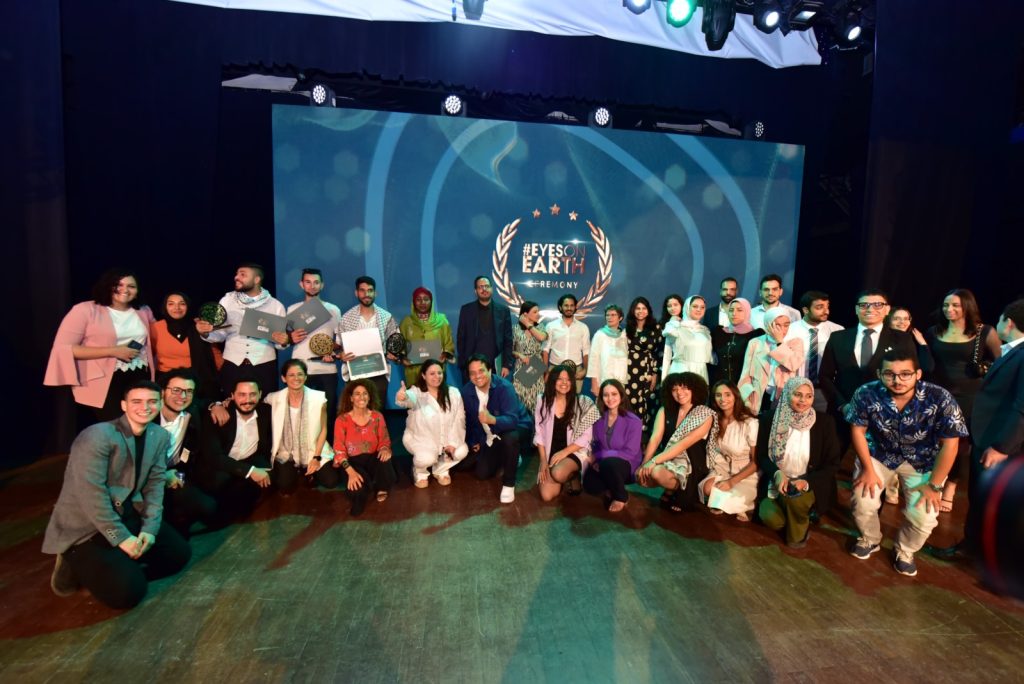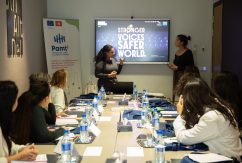EyesOnEarth from Egypt: Innovative projects highlight forest and environmental protection
The stage of the National Museum of Egyptian Civilization hosted a meeting between young people from different Arab countries generating a large number of ideas and initiatives… during the ceremony of the “EyesOnEarth” campaign and competition, launched by EU Neighbours South a year ago, with the aim of providing sustainable business models on forest conservation and the environment.
In the presence of history, debates revolved around the future: “How do we protect our forests?” and “How to preserve the environment”.

“We had to start all over again. We had to continue this campaign.” This is how Joumana Brihi (Team leader, EU Neighbours South) began, referring to the difficulties faced in organizing this event after the Gaza war on the last October 7. But in her opinion, “it was worth it to happen, to show those impactful projects that the campaign and its competition brought.”
In a festive atmosphere, the winning projects of the “EyesOnEarth” competition came to light, with eight projects qualifying for the finals, and five of them won, after 225 projects competed, including 137 for the environmental innovation category, and 88 for the civil society initiatives category from the eight Arab countries in the Southern Mediterranean region: Algeria, Egypt, Jordan, Lebanon, Libya, Morocco, Palestine, and Tunisia.
The first prize in the environmental innovation category, “The Other Dada”, was taken by Adib Daddeh, a Lebanese engineer who is working to rehabilitate the forests and green spaces in his city after being attracted by the issue of sewage on the Beirut River for years.
“What really motivates me is the ability to attract people to desolate and degraded areas and get them involved, cleaning and actually planting a tree. They know they have the power to change.” In the meantime, Adib is waiting for more support from his government to work on neglected public land they are disregarding.
In any case, this honor represents “a step forward, an example that he will share with people,” he says.
The second prize in the same category went to Kamel Ferrah’s project ” Pistachio Grafts”, which began in 2019 and focuses on planting new pistachio trees in the areas of the Green Belt in Algeria, which limits the advance of sand (desertification) towards the north. “The existing dam trees are fruitless and do not tolerate diseases, unlike resistant pistachio trees with higher productivity,” he said.
Kamel, the veterinarian who has grown 10,000 trees so far, considers his reward “a recognition of the world for his work and effort.”
In the CSO category, Othman Taleb and his team won their first prize with their non-profit project “Akkar trail”, a project that protects Lebanon’s forests and their surroundings through the speed of extinguishing their fires, which have increased over the last 8 years.
Othman and his small team rely on simple capabilities that do not exceed drones and some tools, as the issue of funding remains his biggest challenge. He hopes that honoring him will be “a good start to his project,” he says, and he will later start forming a bigger team.
The second prize in this category went to Mehdi Ben Sira, with his project “Ocean Horizons”, who drew attention with his idea of protecting the Atlantic gas route crossing the Algerian province of Saida – where Mehdi lives –before reaching Africa, by equipping this road, preparing water points, and preserving its rare plants.
Mehdi admits that only about 5% of Algerians welcome his idea, as is the case for similar environmental projects in Arab countries, so he sees his reward as more than just honoring: “We carry the image of our Governorate here. I want the world to know about the Saida Governorate and its tourist resorts; with it my project will expand.”
The Palestinian Saad Hanani (24 years old) won the last prize awarded by the jury and voting committee, with his project “Furange”, the idea of which is to use orange peels by extracting cellulose and transform it into threads and clothes.
Saad showed feelings of happiness mixed with surprise, as he could not believe that he won an award after missing the two awards in the environmental innovation category, saying that it is “proof that Palestinian youth, despite all difficult circumstances, are able to participate, compete and win.”
Other projects have been finalists, but have not been lucky with the awards, such as the project for the protection of local heritage in the oasis of Timimoun in Algeria by Fadila Daldli, the project on seeds (CEDAR Association) by Hicham Chenaker from Algeria as well, and the “REMER” project in the environmental innovation category of Lebanese Margot Mrad on the use of beneficial bacteria to bring the soil to life and increase its fertility.
Margot says she didn’t expect to reach the finals in the first place, because her project is not about forests unlike others, so she is proud to participate despite not winning.

The EyesonEarth competition follows two editions of previous campaigns led by EU Neighbours South: EyesonGreen, which focused on green entrepreneurship, and EyesonBlue, which acknowledged water problems.
“This year, we decided to keep our eyes on forests, which are very important for our planet” says Joumana Brihi, Team leader, EU Neighbours South. The new campaign is aligned with the EU forest strategy for 2030, which reflects the EU’s commitment to protect forests, promote their sustainable management and conserve their biodiversity, taking into account climate change mitigation.
Joumana talks about how proud she is of those projects that won the competition: “Young entrepreneurs are really change-makers, they are making a difference in this region, despite all the terrible challenges we are going through.”
As for the criteria on which the expert committee evaluated the projects, they were “impact on forests, reduction of emissions, and reforestation,” as Joumana recalls, and then adds: “But we also took into account the social aspect, such as the size of the initiative or project, its scalability, and the extent to which the team was able to perform and raise awareness.”
Winners will receive financial support, but the biggest support in Joumana’s opinion is communication, vision and working together.
The award ceremony took place in the presence of Ambassador Christian Berger (Head of the European Union Delegation to Egypt), who thanked the entrepreneurs, saying: “They came up with great ideas. You are saving your future, and a little bit of my future too. I think we all need to work and redouble our efforts to make sure we can meet the goals that the world has set for itself, to reduce greenhouse gas emissions and achieve climate goals.”
Christian Berger then talked about the work of the European Union in Egypt. “We are doing a lot of work in terms of the environment, especially on the issue of renewable energy, where Egypt has a lot of wind, a lot of sun, a lot of land, and we can set up wind farms and solar panels,” he said. We are happy that this has happened with our support. The other issue is water treatment. I think those two aspects are important in what you’ve done in this competition, and what you’re going to do next.”
Believing that forests are a “strong and important ally” against climate change in the Mediterranean, which has warmed and hosts some 180 million people suffering from heat waves, wildfires, droughts and air pollution, ENP South and its partners SwitchMed/ MedWaves and the European Mechanism of the European Forestry Institute are collaborating to launch this competition.

In addition to the competition results and the winning projects, the ceremony witnessed discussions by “TEDx Mahta AlRaml “. 12 people from Egypt, Algeria, Lebanon, Jordan and Morocco took to the stage to talk about their experiences, journey, and vision for environmental protection, climate change adaptation and entrepreneurship.
Writer and entrepreneur Mahmoud Mansi, from Egypt, spoke “about the idea of reaching the goals without harming the SDGs, training employees and volunteers, not mobilizing them, and knowing the needs of the place where we live.” Ghaith al-Momani from Jordan, touched on the green tourism experience that has begun in Aqaba. As for Lahcine Majdoubi, he presented his project on cycling in his country, Morocco, so that there would be a lifestyle that preserves the environment.
Nour Hazem participated from Alexandria, a city threatened with drowning as a result of climate change; she focused on the role of women in protecting the environment and the need to support them. “I was really nervous at first but excited, the EU provided us with an opportunity to listen to the projects of other people from different countries and engage with them,” she says at the end of the ceremony.
There was a bustle and enthusiasm from participants across the venue regarding the EU activities. Questions were asked about the EU and the environment through EU Jeel Connect, a network founded to promote EU opportunities for youth, networking and communication, led by Ahmed Yassin.
Ahmed participated in the school awareness programs in Egypt, which took place recently within the framework of the EyesonEarth campaign. Not only have new projects and initiatives emerged, but volunteers and EU delegates have campaigned to clean up forests and plant trees in Lebanon, Tunisia and Algeria. Since Egypt does not have forests, school outreach programmes have been held.
Ahmed says of his participation: “In school awareness… It was very dynamic; we started with dialogue with the little ones, then the implementation on the ground, the planting, and we also try to identify the problem of waste and water.”
The campaign also extended to social media, with videos streaming from the eight southern neighbouring countries showcasing some of the EU-funded projects in each country, along with awareness messages about forests. Joumana Brihi, Team leader, EU Neighbours South, says: “Social media is basically the strongest thing we have, so we are always raising awareness.”




























 Syria
Syria 



